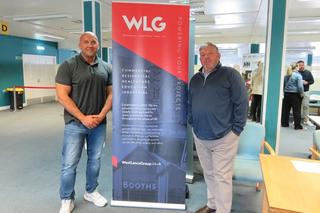Reoffending rates in the UK: Breaking the cycle of reoffending
Adult Provision

For over 30 years, Novus have been working with learners of various education levels and abilities, in prisons across England and Wales. Prison education is a key contributor to a learner’s successful rehabilitation, which is why we try to engage as many prisoners as possible so that they can gain the skills and qualifications needed to thrive upon release.
Prisoners reoffending on release has a significant cost to society, so it’s vital that we engage prisoners in education so that we can equip learners with the skills, qualifications and experiences needed to become well-round individuals, ready to give back to their communities upon release.
Reoffending rates in the UK
According to the most up to date Government statistics the reoffending rate in the UK is 26.5% whilst over 56% of offenders who are serving sentences of less than 12 months will go on to reoffend.
Reducing reoffending in the UK
Prisoners reoffend due to a variety of reasons from lack of support once released, poor mental health, difficulty finding employment and lack of qualifications and education. At Novus we implement a variety of strategies so that learners can get the support they need whilst in prison, so that they’re equipped with the skills, knowledge and qualifications necessary to be successfully rehabilitated.
Education and reoffending
Research conducted by the Ministry of Justice found that “people who had participated in education whilst in prison were significantly less likely to reoffend within 12 months of release than those who had not”. Prison education plays an integral role in reducing reoffending and helping learners find employment upon release, which is why we try to engage as many prisoners as possible in our education offer.
With many learners entering custody with no qualifications, low education levels and poor previous experiences in education, it is crucial that we engage them in a way that meets their individual needs so that they can be equipped with the skills and qualifications necessary to find employment upon release.
Functional Skills
English, maths and digital skills are essential functional skills needed to find employment upon release and function as a member of society. By improving learner’s confidence and ability in English, maths and essential digital skills, we help learners close their skills gaps so they can find and retain work that keep them from re-offending post release.
Vocational Training
Providing learners with industry-relevant skills and experience for their chosen career path means they can find employment or further training upon release and build a positive future.
We offer learners high-quality vocational training programmes, short courses, taster courses and training workshops all delivered by skilled and experienced tutors and trainers who are experts in their field. Our learners work towards nationally recognised qualifications, with embedded English, maths, and employability skills available for those learners who need extra support, so they can develop a holistic skill set required by employers.
Employment and reoffending
Studies show that prison leavers who find a job after release are less likely to reoffend, highlighting the importance of learners finding employment upon release. Employment is a key factor in rehabilitation and reducing the risk of reoffending. Our experienced team provide an extensive range of related support to help learners develop the skills and strategies needed to find, apply and secure long-term employment.
Our employment support includes:
- CV advice and guidance
- Job searching and application help
- Guidance on disclosure
- Interview preparation and performance
Novus Works
As part of our employment support, we also have our Novus Works team, who act as a middle ground between our learners and employer partners, creating a bridge from education to employment.
For learners, Novus Works help to build confidence through interview practice and CV development, whilst on the employer end, Novus Works help pair prison leavers with local and national employers and help minimise the resources required to secure talent.
Working with employer partners
To provide more employment opportunities for learners, we also work in partnership with a varied range of local and national employers.
Working with employers such as Greene King and Balfour Beatty, enables us to create employer-led vocational training programmes and develop viable routes into employment. Our partnerships also allow learners to form connections and professional relationships with local and national businesses that will help them to find employment upon release.
Working with employer partners to support learners into employment at HMP Low Newton
HMP Low Newton recently had a visit from Mott MacDonald to support with the employment provision at the prison. A team of project managers from Mott MacDonald delivered a session to 6 female learners, focusing on helping them identify and develop their soft skills in preparation for future employment. The visit was facilitated collaboratively by Sarah, our Novus Works Resettlement Coordinator and IAG Provider, Acron.
The session was well received, leaving learners feeling positive and uplifted with encouraging feedback from learners including:
Sharing information about everyone’s goals and listening to how to use soft skills was good
Neurodiverse support
With over 30% of prison learners having learning difficulties and/or disabilities, it is crucial that we are addressing the needs of each learner so that they can engage in education. At Novus we are dedicated to tailoring our education services so that all learners, can access the education and support that they need to gain the skills and qualifications needed to thrive upon release.
Our provision includes support and guidance, tailored learning programmes, accessible learning environments and adapted curriculum materials. Also, our skilled and experienced SENCo’s, teachers, tutors, trainers and support colleagues work with learners to identify support strategies, aids and adaptations to enable their progression in learning.
How tailored education plans benefit neurodiverse learners
At Novus, when it comes to prison education, we are aware that the ‘one size fits all’ approach doesn’t benefit our neurodiverse learners. Tailoring our education plans to meet the needs of each learner is integral to our education provision, so that all learners have the chance to access education programmes and services.
Tailored education programmes accommodate different learning styles so that learners are able to engage in education in their own way, making it a more positive experience for them. With the right support and needs being met, learners are able to take part in education and gain the qualifications needed to find employment upon release.
Being able to take part in education, in a way that suits them proves to learners that they are capable of thriving in a learning environment and obtaining new qualifications and skills.
Learners will have new-found confidence in themselves and abilities raising their self-esteem and belief in a positive future. With their skills, qualifications and belief in themselves and their future, learners have a better chance at being successfully rehabilitated and finding employment upon release.
Creative enrichment to support mental health and wellbeing
Our creative enrichment provision provides learners with the opportunity to improve their self-knowledge, develop self-confidence, behaviour and attitudes, improve interpersonal skills and encourage learning.
Creative enrichment helps to engage learners in education who wouldn’t engage otherwise and encourages them to get involved in education in non-traditional ways. By engaging in education in a way that meets their needs, learners will start to see education in a positive way which will encourage them to pursue further education and obtain skills and qualifications which will help them find employment upon release.
Our creative enrichment provision also helps to support learners with their mental health and wellbeing. By taking part in art projects or enrichment activities, learners are given a positive outlet to process their emotions and experiences in a healthy way. Through creative enrichment learners can find new ways to vent their emotions and share their experiences through creativity which will have a positive impact on their mental health and wellbeing.
Wellbeing events
As part of our mental health and wellbeing support, it is important that we provide the information and skills necessary to educate learners about their general health and mental health and wellbeing. So, that whilst in prison and upon release they are able to put the correct steps in place to ensure they are looking after themselves and get help and support if/when they need it.
Celebrating International Men's Health Week at HMP Liverpool
HMP Liverpool arranged a collaborative wellbeing event to mark 30 years of International Men’s Health Week, a global initiative aimed at increasing awareness of male health issues.
In 2024, the International Men’s Health theme focused on testicular cancer. Novus staff, learners and partner agencies all participated in the event, which saw the curriculum replaced with fun wellbeing activities, designed to boost learner’s moods and enhance their knowledge around testicular cancer, their general wellbeing and mental health.
Supporting family ties to reduce reoffending
Research suggests that learners who maintain positive family ties are less likely to reoffend upon release. At Novus, we run a range of family engagement programmes across our prison sites so that we can provide the best opportunities for learners.
Strengthening family ties at HMP Highdown
HMP Highdown have been incorporating art into their Storybook Dads initiative as a way to strengthen family ties. Learners record their chosen story in the library and then are invited to an art session where they have the opportunity to create a drawing or painting based on the characters and story in the book.
The project allows learners to engage in reading and respond creatively which in turn can have a similar positive impact on their children.
Does rehabilitation reduce reoffending?
In order for reoffending rates to decrease, prisoners need to be successfully rehabilitated so that they can positively contribute to society. Taking part in the support and provisions that are offered in prisons such as education and employment support will give learners the confidence, skills and qualifications to find employment upon release, which will help them support themselves and their families turning away from a life of crime.
Taking part in mental health and wellbeing support as well as creative enrichment also positively contributes to an individual’s personal development. They are able to find themselves and be equipped with the support strategies, techniques and services required to support themselves upon release from prison.
Through the education, enrichment and wellbeing support programmes that Novus offer, we provide learners with the skills, knowledge and qualifications needed to thrive in society.
To find out more about how we support learners in education as well as their rehabilitation, take a look at the news section.


